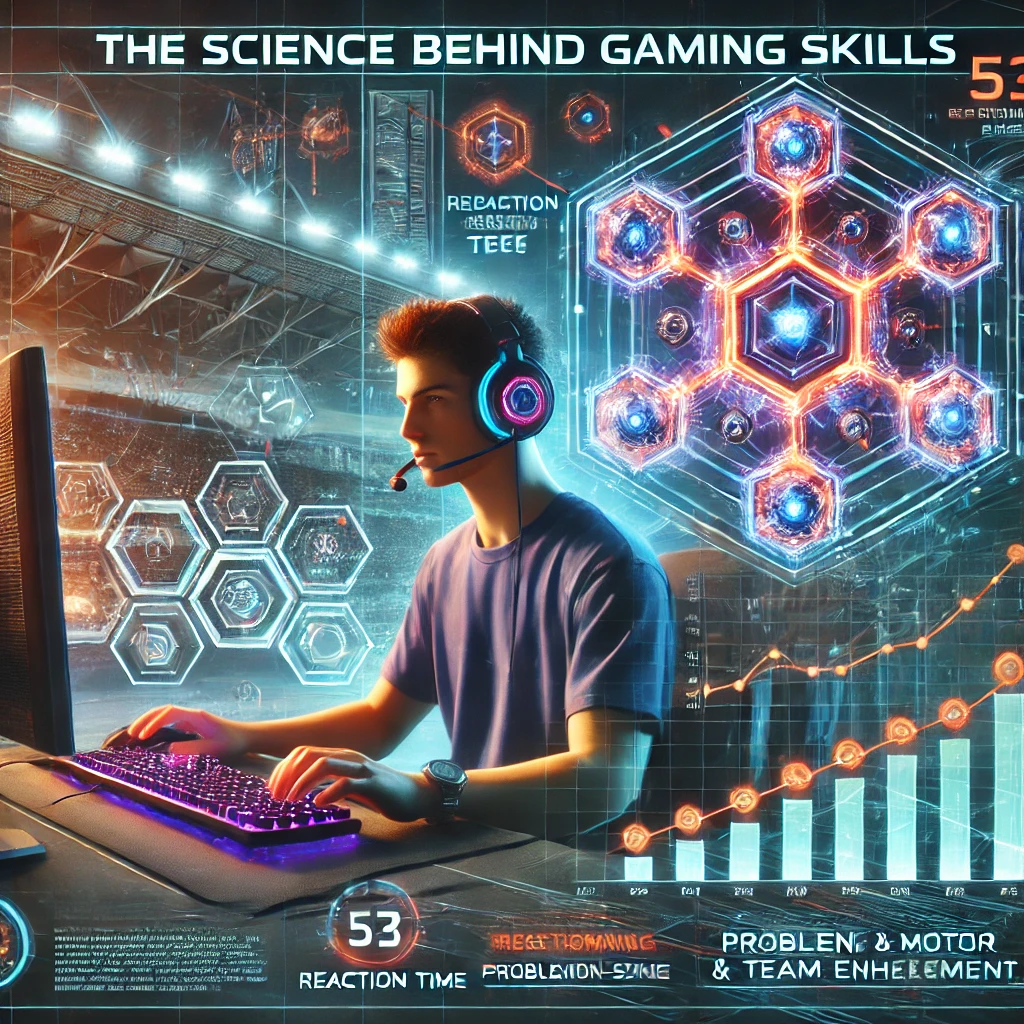Introduction: How Online Games Sharpen Skills
Online gaming is more than just entertainment; it is a dynamic platform for skill development. Whether competing in fast-paced shooters, strategizing in real-time strategy games, or collaborating in multiplayer role-playing games, players constantly enhance their cognitive and motor skills. But how does this happen? The science behind skill development in online games involves psychology, neurology, and behavioral adaptation. In this article, we will explore how gaming enhances various skills and how players can optimize their learning process.
Cognitive Skills Enhanced by Online Games
1. Problem-Solving and Critical Thinking
Many online games, especially puzzle, strategy, and role-playing games, require players to analyze situations, develop solutions, and think critically. Games such as chess-based strategy games or escape room challenges force players to make decisions under pressure, boosting problem-solving abilities that can be applied in real-life situations.
2. Memory and Learning
Games require players to memorize maps, controls, character abilities, and item locations. Repeated exposure to this information strengthens memory and recall abilities. Studies have shown that games can improve working memory, which is crucial for multitasking and quick decision-making in both gaming and real-world environments.
3. Attention and Focus
Fast-paced games like first-person shooters (FPS) and multiplayer online battle arena (MOBA) games demand high levels of concentration. Players must track multiple elements simultaneously, such as enemies, teammates, objectives, and environmental changes. This constant demand for attention strengthens a player’s ability to focus for extended periods and ignore distractions.
Motor Skills and Reflex Development
1. Hand-Eye Coordination
Online gaming, especially action-packed genres like FPS and racing games, enhances hand-eye coordination. Players must react to visual stimuli quickly while executing precise movements with a keyboard, mouse, or controller. Studies suggest that gamers often have superior hand-eye coordination compared to non-gamers.
2. Reaction Time
Competitive games require split-second decisions. The ability to process visual and auditory cues rapidly can mean the difference between victory and defeat. Studies indicate that gamers develop faster reaction times, which can be beneficial in activities like driving or sports.
3. Fine Motor Skills
The dexterity required to control complex movements in games improves fine motor skills. Professional gamers demonstrate an exceptional ability to control precise finger movements, a skill that can translate to other areas like playing musical instruments or performing surgical procedures.
Social and Emotional Development Through Gaming
1. Teamwork and Communication
Multiplayer games require effective communication and collaboration. Players work together to achieve common goals, requiring coordination, leadership, and adaptability. This experience translates into improved social skills and teamwork in professional and personal environments.
2. Emotional Regulation and Patience
Competitive gaming often involves losing, which teaches resilience. Players learn to manage frustration, analyze mistakes, and improve performance over time. This helps develop emotional control and the ability to handle stress effectively.
3. Decision-Making Under Pressure
In high-stakes games, players must make quick decisions under pressure. Learning to weigh risks and benefits in split seconds enhances decision-making skills, which is valuable in real-world scenarios such as business negotiations and emergency responses.
How to Optimize Skill Development in Online Games
1. Practice with Purpose
Engaging in deliberate practice—such as setting specific goals, analyzing gameplay, and seeking constructive feedback—leads to faster skill improvement. Many professional gamers use recorded gameplay to review mistakes and refine their strategies.
2. Adapt to Different Playstyles
Exposing oneself to different genres of games broadens skill development. Strategy games improve planning, FPS games enhance reflexes, and role-playing games strengthen decision-making and resource management.
3. Use Technology to Enhance Learning
AI-driven analytics tools and training programs can help players identify weaknesses and improve gameplay. Many esports teams use specialized training regimens, including reaction time tests and scenario-based learning, to maximize performance.
4. Maintain a Healthy Balance
While gaming offers many cognitive and motor benefits, excessive play can lead to burnout and negative effects. Taking breaks, staying physically active, and maintaining social interactions outside of gaming ensure a healthy balance.
The Future of Skill Development in Gaming
As gaming technology evolves, so do opportunities for skill enhancement. The rise of virtual reality (VR) and augmented reality (AR) games offers even more immersive learning experiences. Additionally, machine learning and AI-driven in-game coaching can provide real-time feedback, allowing players to accelerate their skill acquisition.
With gaming becoming more integrated into education, workplace training, and cognitive therapy, the perception of gaming as mere entertainment is shifting. You will find good games on this site https://1winua.com.ua/. Understanding the science of skill development in online games reveals their potential as valuable learning tools that enhance cognitive, motor, and social abilities.
Conclusion
Online games are more than just a source of entertainment—they are powerful tools for developing critical life skills. Whether improving problem-solving abilities, reaction times, or teamwork, gaming provides a dynamic and engaging way to enhance cognitive and motor functions. By understanding the science behind skill development in games, players can maximize their learning potential and apply these skills to real-world situations. As technology advances, the future of gaming as a medium for education and skill development looks brighter than ever.
